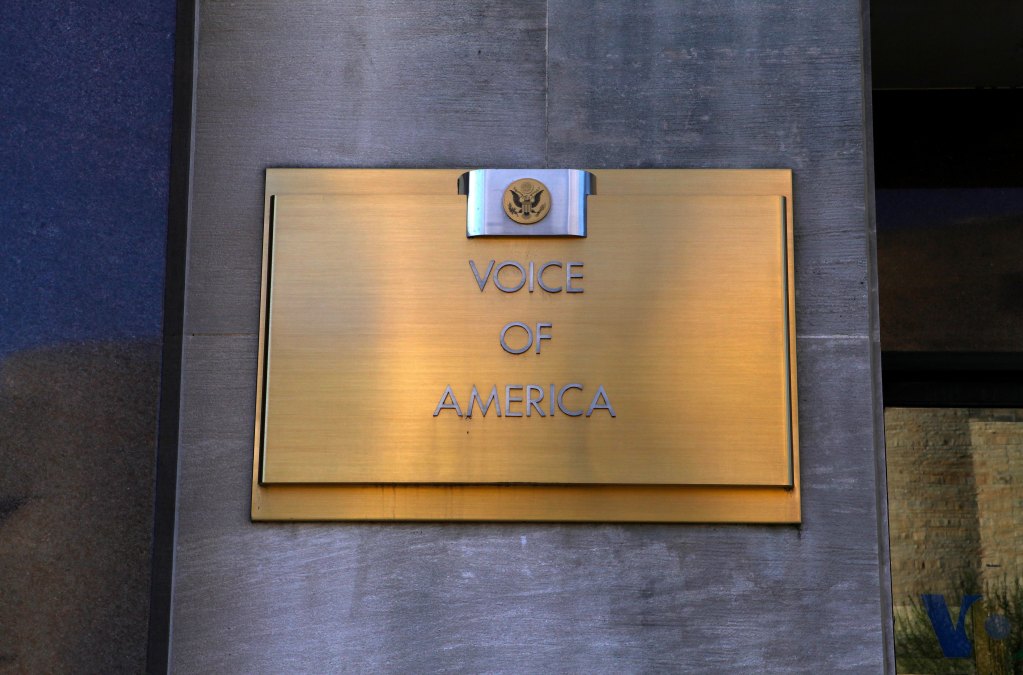VOA faces internal backlash over newsroom guidance on use of generative AI to voice news reports

Dozens of journalists and staff at Voice of America are strongly opposed to the state-owned news organization’s plan to use AI-generated synthetic voices, documents obtained by FedScoop show, with employees expressing concerns that the tool could breed mistrust with its audience, cause misinformation to spread and potentially eliminate jobs within the newsroom.
VOA, which has a weekly worldwide audience of approximately 326 million, is the largest and oldest of U.S. government-funded news networks and international broadcasters.
The news organization released internal guidance on the use of artificial intelligence in November, following months of discussions with journalists and labor representatives that stirred up backlash and controversy within the news organization.
FedScoop obtained the new AI guidance as well as a letter of opposition — signed by dozens of journalists within the news organization — that was sent to VOA leadership in October and has not been made public until now.
“We are deeply concerned that a portion of the Artificial Intelligence guidance that the agency is preparing to issue will do more harm than good,” the signed letter said. “Specifically, we object to language that would allow Artificial Intelligence to be used ‘for voicing scripts.’”
“We are also concerned that guidance that permits Artificial Intelligence to voice news reports and other products, even with the caveat that ‘a human being retains full control over the journalistic content,’ will allow for VOA to begin to replace on-air journalists with AI,” the letter continued.
Two VOA employees who asked to remain anonymous to avoid internal backlash told FedScoop that the newsroom is already experimenting with using AI-generated synthetic voices in its broadcasts.
The two employees said that the U.S. Agency for Global Media, VOA’s parent agency, told union representatives that AI usage at VOA was not something they could bargain over. The two employees also said that VOA leadership rejected all proposals put forth by staff to change the AI guidance released in November.
The VOA AI policy guidelines state that AI “may be used for voicing scripts, so long as a human being retains full control over the journalistic content. Furthermore, synthetic voices should never be used to impersonate or duplicate any individuals, including agency employees or public figures. This includes AI-generated content using an individual’s or employee’s likeness, image, and character.”
Furthermore, the AI guidelines state that “if generative AI is used to research, develop ideas for, voice, or review VOA content, it must be acknowledged in a credit, tagline or ender or otherwise attributed in a script.”
Some editorial staffers at VOA say they are concerned that the newsroom’s AI guidelines are ambiguously written, making it unclear the extent to which AI-generated synthetic voices could be used within news broadcasts sent to its audience of hundreds of millions of people.
“We’re not luddites,” a senior VOA journalist said. “This isn’t a knee-jerk opposition to AI, but if all of a sudden someone reading the news for a TV package with a voiceover or a radio report is not a real person, then how would anybody believe that what the rest of what we’re doing is real? That’s our main objection.”
“It’s going to blur the line between what is real and what is fake,” the journalist continued. “Our competitors are state broadcasters from Russia, China, Iran, and that’s what they do. They engage deliberately in misinformation and disinformation, blurring the line between real and fake.
“And if we’re putting on the air AI voices that aren’t real, why would people trust that the content is real? I think there should be a real person behind every story, and my colleagues share that concern as well, the overwhelming majority of the primary correspondents of VOA, which is dozens and dozens of us.”
In the objection letter sent to leadership by VOA staff and in interviews conducted by FedScoop with organization members, employees expressed frustration with management’s handling of AI policy in its guidelines and in private conversations, and worried that maintaining high journalistic standards was not the top priority.
“A lot of the journalists at VOA are upset about this and have expressed this to management,” said Paula Hickey, a VOA employee and president of AFGE Local chapter 1812. “They feel VOA management is not doing anything about their concerns, management is not talking about it or saying how they’re going to use the synthetic voices or if someday it will replace employees with it. It’s all very confusing and unsettling.”
“Voice of America already has many detractors — foreign governments around the world — that accuse it of being propaganda,” Hickey continued. “And VOA has worked very hard over the years to battle this image. These AI-generated synthetic voices create a lot of concerns and risks about maintaining our integrity and could damage trust with our audience. If that happens, you can’t put the genie back in the bottle.”
Some journalists at VOA are concerned that the new use of generative AI outlined in the guidelines could lead to job losses in the near future. The senior VOA journalist said those concerns have been relayed to and rebuffed by management.
“I would say a number of us believe they are making decisions not based fundamentally on concern for journalism. They see this as an efficiency move, and in the future it may be a way to significantly reduce the number of personnel, which would save them money.”
The senior VOA journalist added that the organization’s newscasters, “especially in Africa and in Asia, have a personal relationship with their audiences. A number of our broadcasters have been on the air for many, many years, through good times and bad. And there’s an emotional connection, a two-way emotional connection. You’re not going to have that with AI voices and newscasters.”
VOA leadership responded to the concerns of its journalists and staff by highlighting the limited scope of AI usage that they envision for the newsroom.
“Regarding the use of AI in voicing scripts, our briefings about the guidelines have made it clear that VOA will only narrowly use AI to add synthetic voicing to text-only copy that appears on our news and Learning English websites,” acting VOA Director John Lippman
said in a statement to FedScoop. “That’s a practice that the Washington Post and many other news organizations have been doing for years.”
Lippman and VOA leadership also said that the opposition letter signed by dozens of journalists in October was “represented by one of the three unions and constitute fewer than 30 of the more than 1,500 VOA broadcasters.”
The VOA leadership highlighted that the AI guidelines emphasize the need for employees to “be judicious and be transparent” when using generative AI tools.
Journalists at VOA say they are unlikely in the long run to win the fight to restrict the use of AI within their newsroom, given the explosion in demand for the emerging technology. But the senior VOA journalist said there’s a feeling among some colleagues that they need to keep fighting for as long as they can.
“Are we fighting a losing battle here over a period of 50 or 100 years? Probably,” the journalist said. “I don’t know that any of us can control what’s going to happen decades from now. But we certainly can voice our concerns now for contemporary journalism and for our current broadcasts.”



